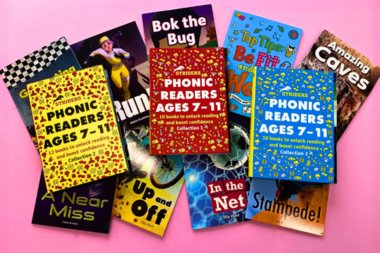Set for Life: Reading for social emotional learning
Growing up in a highly interconnected world, children are more likely to be exposed to people from backgrounds unlike their own and to situations they haven’t experienced before. As adults, they are likely to be in environments that require collaborating with a variety of people. This makes learning soft skills, such as how to relate to others, more important than ever.
Aside from mastering core academic competencies, there’s a growing focus on helping children with social-emotional learning (SEL). SEL is aimed at helping children gain self-awareness, better understand, navigate, and express their feelings and build interpersonal skills. Over time, children develop their sense of empathy towards people of different cultures, establish positive relationships, and be able to handle challenging situations more constructively.
For teachers and parents, books are one of the most easily accessible tools to teach these skills. Over centuries, oral and written stories have been windows to other worlds and other people’s experiences, capturing imaginations and often providing a moral blueprint to live by. In a recent Scholastic survey, educators said books help students understand people who are different than them, develop empathy, see themselves in characters and stories, and help discuss challenging topics. Through reading, SEL takes place as children develop their literacy skills.
SEL across the development span
SEL encompasses children’s developmental stages. Between ages 2 to 7, children tend to think symbolically; they focus only on themselves and have difficulty seeing things from the perspective of others. At this stage, stories about friendship are good vehicles to introduce SEL. A large body of illustrated books has been published in recent years focused on helping pre-schoolers identify and make sense of their feelings, learn how to make friends, and be considerate of others. Reading fairytales, a favourite activity for young children, offers opportunities to help them identify primary emotions such as joy, sadness, fear, surprise, and disgust.
By the time school-age children develop their logical skills and begin to think about how other people feel or think, reading transitions from picture books to chapter books. They begin to read stories with more complex story lines — with heroes, villains, and sidekicks. Adventure, fantasy, and other stories are opportunities for children to learn about relational dynamics, imagine how it’s like to be in the characters’ shoes, learn the basics of decision making (right vs wrong), as well as appreciate the cultures and traditions outside their home countries or regions.
Around puberty, children start to think more abstractly and ponder moral, ethical, social and political issues. At this stage, reading for SEL may explore more complex global themes such as migration and gender equality, which are typically weaved into autobiographies, memoirs, novels, and other genres. A study of Italian fifth graders showed that reading passages from the Harry Potter series improved their attitudes toward groups such as refugees and immigrants.

Enhancing the reading experience
Access to a diversity of voices, particularly books touching on different cultures, is important in SEL. Online reading platforms such as Scholastic Literacy Pro can provide teachers and parents a wide variety of high-quality books from around the world, which may not be available at the local public or school library, to support children’s learning. Searching for and checking out a book have never been easier, and with continuous updates to its virtual library shelves, Scholastic Literacy Pro can accommodate children’s needs according to their developmental stage and literacy goals. With the aid of teachers and parents, young readers are guided to find the right books for their reading ability or Lexile levels — a measure that’s based on over 30 years of literacy research.
Supplementing the online reading experience with real-world guidance can enhance children’s learning experience. Reading aloud, for instance, not only captures children’s attention but also makes it an immersive experience. Reading aloud at home offers opportunities for parents to bring lessons to life by sharing their own experience with their children. Teachers may use dramatic tools to make things experiential or encourage open-ended questions to further explore topics. They may also tap on global themes to inspire students to read more about topics that affect people around them. A major sporting event such as the World Cup, can also help drum up interest in reading stories set in the countries which qualified for the event. Gamifying the experience may also appeal to younger readers – for example, a bingo reading game, wherein students earn points or prizes for reading a diverse set of books while parents and teachers continue to monitor their Lexile progress.
Learning social emotional skills doesn’t stop once children grow up — it is nurtured throughout life and passed on to the next generation. Instilling the habit of reading and the sense of curiosity can give children a sound foundation of values to navigate the future.
Similar Posts
-

Building Confidence at Home with 11+ Practice Books: A Parent’s Guide
Hear from Alima Rahman, a full-time 11+ English tutor and founder of Bright Minds Club – 11+ Tuition, as she talks about how parents can help build confidence in their child at home with the Scholastic Pass Your 11+ range.
-

The Challenges of Teaching Phonics Beyond KS1
Hear from Mr Levick, a phonics specialist in secondary school and former primary English subject lead, about the challenges of teaching phonics beyond KS1 and how Striders phonics readers can help.
-

Supporting Students with Dyslexia in the Classroom
Specialist Dyslexia teacher assessor, Jo Rees, explains how teachers can support students with dyslexia in the classroom using the Scholastic Annotation Edition GCSE English Set Texts.

